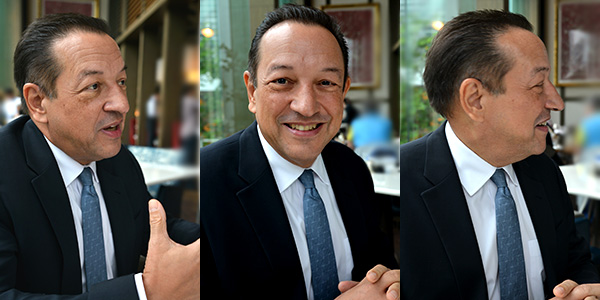|
INTERVIEW Changing Hong Kong perceptions comes down to storytelling
‘The best part of my day is when I walk about and talk to guests.’ Area VP and GM Grand Hyatt Hong Kong Richard Greaves on advisories, robots and sustainability. July 2024 SEE ALSO Franz Donhauser | Novi Samodro | Choo Leng Goh | Maria Helena de Senna Fernandes | Anchalika Kijkanakorn | Cavaliere Giovanni Viterale | Hans Jenni | Iwan Dietschi | Carina Chorengel | Peter Caprez | Louis Sailer | Ruby Garcia 
Grand Hyatt Hong Kong GM Richard Greaves talks about dealing with travel adviisories, robots and sustainability issues at his award-winning hotel as he creates experiences and prods MICE business to return/ photos: Vijay Verghese Coming off a series of multi-course meals at a recent travel expo, Richard Greaves looks ruefully at his waist. I notice nothing out of the ordinary. As always, Greaves is well groomed, soft spoken, ever the gentleman — his primary calling many feel. He is thoughtful but quick on his feet and mentally honed to a sharpness born of years of experience in Taipei, Shanghai, Bangkok, Macau and Hong Kong and, of course, the trying pandemic times when as Area Vice President and General Manager of the flagship Grand Hyatt Hong Kong he turned staycations into a hugely successful art. Lunching at the Grand Café, at a discrete corner table on a bright June afternoon, he spoke with Smart Travel Asia Editor Vijay Verghese about the city’s perceived travails and remedies, the future of hotels, and why he got into the business. Dressed in a dark suit with a quiet blue-grey tie – all part of his quiet reserve — a wry smile flits across his face as he peruses the menu intently. Then he looks up and softly articulates his vision for the road ahead. Originally bound for the world of finance, Greaves changed course and completed a Bachelor of Science in Hospitality at the University of Surrey in 1986. He soon found himself in the thick of things in Asia. Greaves is polished. And he is surprisingly shy in front of a camera. Smart Travel Asia: Let’s jump in the deep end. With talk of negative publicity scaring off travellers to Hong Kong, what can you do as a hotelier to counter this? RICHARD GREAVES: It’s all in how we counter the perception vs the reality. Seeing is believing. We go out and tell people to come and see for themselves. Our guests leave with a favourable impression. People are happy to see such a vibrant city. It’s in our storytelling. Storytelling? RG: In the US they ask, “Is Hong Kong safe?” [Arches eyebrows] I ask, “Are US streets safe?” I’m here with my family. We’ve been here for years. And we’re happy. If we look at travel advisories from the UK, USA, and Australia, they’re all about warning people to be careful. People look at these and marry it with what they’re reading and draw conclusions. There are lots of advisories. We draw attention to positive news and how well events are developing [in Hong Kong]. Long-haul travel from the USA and UK is growing. This is the reality. What post Covid trends do you see when it comes to guest habits, say demand for eco-friendly products, food sourcing, giving back to the local community, cutting wastage and applying new technology? RG: Since Covid, the mix of travellers has changed. There are more business travellers from the Mainland. In terms of behaviour the type of traveller is changing. There’s less corporate travel. They’re achieving what they need through Zoom and so on. But on the flip side we’re seeing strong leisure travel. Are you equipped for this surge in leisure travel? RG: Absolutely. We’re right on the harbour. We have a huge pool, spa, gym, kids’ facilities… We have a lot to offer as a family friendly hotel. Our own Hyatt World of Care [program] also looks at our carbon footprint, policy on waste, single-use plastics, sustainable purchasing and so on. Do guests ever enquire about where food is sourced? Is there that level of awareness and interest? RG: Yes, people want to know if you share their sustainability values. They’d rather give their business to people on the same page. We are EarthCheck certified [a science-backed benchmarking effort in over 70 countries]. We have symbols on our menus to indicate sourcing. There is no single use plastic in rooms. Dry amenities like cotton buds and razors have changed to environmentally friendly packaging. There is less waste. We use 750ml glass bottles in rooms and we encourage guests to bring their own. Are staycations still important? RG: They’re obviously not as popular now. However there is still demand from people who don’t wish to pay for expensive airfares. Covid demonstrated there is value in Hong Kong. You don’t have to go overseas. Staycations maximise time for a short break and are cost-effective. You had staff swapping roles during the staycation peak. This proved transformative for many, offering new perspectives on hoteliering. Did any later opt for offbeat roles? RG: Most went back to their normal roles. Are hotel rates going up or down? RG: Rates are all down due to the mix of customers and purpose of travel. More leisure and more regional business travel puts pressure on rates. The long view [gazes out thoughtfully] is that MICE [meetings incentives conferences and exhibitions] will lift the pressure. Having good MICE business is good for rates. When might MICE business return? RG: This takes time. Big MICE groups are planned well in advance. They may pick Singapore, or Thailand, or skip Asia altogether. We do see signs of MICE returning. We need to be agile as the world is changing. Are guests more demanding now? RG: If anything they were more demanding during Covid. Of course all guests want great service — that never changes. During Covid people spent their own money and asked for more. Do you see many GenZ and Millennials here at the Grand Hyatt Hong Kong? RG: [Looks around the café and shakes head with a smile] Take a look around. Yes we do have them as hotel guests. Some go over to our new cocktail bar LIPS that opened in April. It’s full of GenZs. They like it. So what do guests want? RG: Chinese travellers today are looking for experiences, not just shopping and eating. We have to provide this. Do you sell your neighbourhood as an experience? RG: Absolutely. We have a [pocket-size] pamphlet too. New visitors enjoy their walks enjoying the harbour, end to end. In summers we arrange picnics [at Tamar Park]. These started during staycation times. Staff arranged blankets to sit on and more. We had a video to walk people through the neighbourhood. Looking back at your time in Macau, Taiwan, Shanghai and Hong Kong is there a common managerial strand that emerges? RG: You have to adapt. Cultures are different. The values of Hyatt are consistent — purpose, care, leadership… these are always relevant in Shanghai or Timbuktu [face creases into a smile]. Many fine Asian hotels got started in the Swiss tradition with great emphasis on routine, rules, rigour and minutiae. Does this continue today? RG: Things have changed. I know many Swiss hoteliers who are not cut from that Swiss cloth. They are hoteliers for today. Thinking has moved on from the days of those larger than life hoteliers. We’re very transparent with staff and owners. When I came to Asia in my younger formative years, I was shaped and influenced by various people. Coming back to a pet peeve, is the lobby-cruising GM dead? RG: The GM is still an essential part of the hotel. You have to be visible to customers and the team. You are more aware and have your finger on the pulse. This is one of the reasons I got into the business — to be around people [gestures with his hands and arches eyebrows]. The best part of my day is when I leave my desk and walk about and talk to guests. What brought you to hotels? RG: [Smiles] My dad wanted me to be a finance guy. I got a degree, I had offers. Then I woke up one day and said, ‘This is not for me’. I was 18 and I had just seen a careers book at school. I spotted a section on hotel management and thought, ‘This is it’. I declined the university offers and decided to work at The May Fair hotel in London. After all, it was the most expensive square in Monopoly [chuckles]. Then I went to Surrey University. The rest is history and here I am. It just came to me. Don’t ask me why. If I reflect on it I think as a kid my parents travelled a lot. I guess some of that rubbed off on me. Of course, our industry is far removed from the glamour and shine. It’s all hard work. What is your idea of luxury? RG: I think luxury has changed. It is not just about beautiful brands and the best silverware. Luxury is in the experience provided to the guest. It’s how you make a guest feel. It’s beyond the tangible. It’s a delivery of intangibles — great experiences not available elsewhere. With so much pressure on revenues these days how do you stay true to the brand vision? RG: We have a brand promise. Brands are not rigid. We have all kinds of customers and segments. We keep making value propositions to different segments. Brand standards remain. When you manage expenses, well… it doesn’t mean you swap Australian beef for a Hong Kong cow [wry smile]. We just have to get smarter. If someone asks if we are cutting costs it upsets me as we are still delivering the same quality. We work smarter [both hands gently chop the table emphasising the point]. If anything, our breakfast spread is increasing. We have a Middle East section, Indian section, Hong Kong section, a vegetarian section… Our biggest cost is payroll. The cost of food and drink is not our biggest expense. Labour is the biggest cost. And what of staff now? RG: Our housekeeping team is very stable. We have a solid number of regular staff. We have solid business without seismic swings in occupancy and we are more or less back to full strength. No hotel is ever fully staffed. What’s the quality level of new staff? RG: Staff recruited from within the industry are easier to work with. They have experience. Trainees need time. There’s always a skill difference between trainees, part-timers and fulltime staffers. The most important thing for us is attitude. The hospitality mindset is critical. Our candidates are a mix of Hong Kong Polytechnic graduates and overseas students. Do new recruits stay? RG: The HK Poly offers hoteliering with real estate so students can go either side. A lot of young people fell out of love with hospitality during the pandemic and now we need to tell a new story in an impactful way. Our industry offers experiences others dream about, as veteran hotelier James Smith recounts in his memoirs At Your Service. These incredible moments are hard to match. How do you see hotels evolving? RG: There are all kinds of hotels. There are several that are very basic. Their style is to ask for payment upfront and guests have no contact with anything. There are those kinds of things already. Various concepts will be out there. But a five-star luxury property like the Grand Hyatt Hong Kong will certainly be around. Will we be contactless? Absolutely not. We may introduce things here and there. Where we can embrace technology in the right way, we will. I think people are satisfied with what we have here. Where hi-tech can help people live better, that’s good — but not as a gimmick. For room service would you be happy to see a robot? I’m not sure. Hyatt does have brands where that is acceptable. Efficiencies in time are valuable, say at check-in and check-out. It’s about simplifying and eliminating pain points that customers face. We can use technology in these areas. But we’re not replacing humans with robots. Send us your Feedback / Letter to the Editor
NOTE: Telephone and fax numbers, e-mails, website addresses, rates and other details may change or get dated. Please check with your dealer/agent/service-provider or directly with the parties concerned. SmartTravel Asia accepts no responsibility for any inadvertent inaccuracies in this article. Links to websites are provided for the viewer's convenience. SmartTravel Asia accepts no responsibility for content on linked websites or any viruses or malicious programs that may reside therein. Linked website content is neither vetted nor endorsed by SmartTravelAsia. Please read our Terms & Conditions. |


